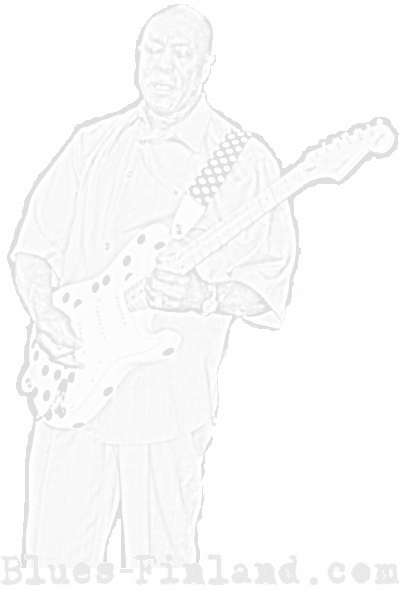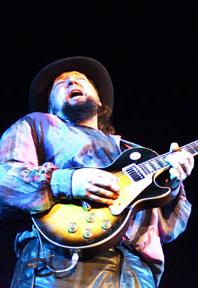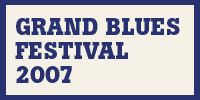 |
| Contact: admin(a)blues-finland.com (c) 2007 Blues-Finland.com |
| Transylvanian Guitar Man 13 March 2007 AG Weinberger is one of the few blues professionals from the land of Dracula. The Romanian recorded his latest album "Nashville Calling" in Tennessee, though. Andres Roots interviews. In Transylvania, the name Attila "AG" Weinberger is synonymous with the blues. An electrifying blues guitarist and singer who has spent years in the US, playing with people like Son Seals, Coco Montoya, Gary Primich and Carey Bell, Attila first realized he would become a guitar slinger when he was 10 years old and recovering from a 4-day meningitis-induced coma; soon he saw Muddy Waters on TV, and everything fell into place. By the time he was 20, he had won several prestigious Romanian music awards as a rock guitarist and acquired the nickname AG, "Attila Guitar", but it wasn't until the mid-1980s that he started a solo career and finally switched to blues – reflecting his conviction that "blues and jazz are symbols of self-accomplishment and social dignity, more than any other form of art." |
 |
| Attila Guitar! (c) agweinberger.com |
| In 1998, Attila started the first Romanian blues society, the BlueSylvania foundation; he has also composed music for several theatrical productions, including Allen Ginsberg's/Jacques Prévert's "Death Father Blues". His current album, "Nashville Calling", was recorded in Nashville with American musicians and produced by two-time Grammy-nominee Tom Hambridge. Transylvania is not a place one would immediately associate with the blues. How long is the blues tradition there - who was the first blues artist there and when? You are right on this one, hahaha… Although the Transylvanian musical heritage is very similar to the Blues. Beside other things, both are based on pentatonic scales and both are talking about real life situations in a spiritual and telluric fashion. As for the second part of your question: it is very likely that our band, The Transylvanian Blues Community, was the very first Blues band in Romania – back in 1986. It was quite difficult and somewhat dangerous to promote such a band, considering the hardships of the communist regime. Luckily, we were able to manage ourselves through the censorship, and by fooling the system, we toured the country twice a year. This meant about 30-40 concerts in mid-size venues – such as theaters and small sports arenas. There were absolutely no clubs around that time in Romania. How many blues bands are there in the country now? Well, it's hard to say. Due to the uncertainty of our business, many players are migrating between genres... Nobody can blame them. At this time in Romania, there are probably only two fulltime blues bands working constantly on a professional level. How many venues are there to play, and what is the live music scene like in general? Across Romania, there are 8 or 9 small-size venues, clubs with up to 250 seats, that have the capacity to put on live shows. Many others are quite improper for receiving live bands, they are mostly disco clubs featuring DJs and karaoke nights. As you can tell, the live music scene, with all genres included, is still waiting for a 'maturity boost' in Romania. We have altogether about 12 fulltime professional live bands working the circuit on a constant basis. This means about 60-70 musicians and 200-250 technical staff. With so few people involved, we can't really talk about a decent live scene or a healthy show business in Romania. Unfortunately, the fake and the dishonest are prevailing, the kitsch and the untrue get all the promotion and media attention… I see this as one of the downsides of badly understood democracy and freedom of self-expression. You spent a long time playing in the States. When was that, how did you end up there, and with whom did you play and in what area? Yes, I did… My first trip was back in '96, when I visited with musicians and producers from Memphis, TN. My second trip took place in '98 when I was invited to perform at The Bluestock Festival and Showcase in Memphis, TN, my show being sponsored and endorsed by the Baltimore Blues Society. Then I had the opportunity and the honor to share the bill and stage with giants such as the late Little Milton, Hubert Sumlin, Leon Russell, Texas Johnny Brown. In 2000, I arrived in Chicago, IL. I planned to stay for 2 months, but I ended up living in the US for 4 and a half years. The late Son Seals took me under his wing at first; we toured Illinois, Indiana, Pennsylvania, and New York for 4 months. After that I settled in Newark, NJ - close to Manhattan, where I started playing in the Village with a great team of musicians: Kevin Harris, Keith Lambeth, and Danny Cipriano. Through a musician's referral service I ended up with a long-term contract for a national tour as sideman for Sandi Brooks – she is a well-known country singer from Nashville. I travelled with her band about 30.000 miles in 7 months across the US. It was a great life experience for me. Finally I settled in Las Vegas, NV where I set up the 'command center' for my endeavor to move my career to the next level. In the meantime I did casinos, clubs, strip joints, corporate gigs… Whatever the job was, I took it. I needed the money! I had a permanent Blues gig at the Sand Dollar Blues Lounge and in The Emergency Room, where I met and played with a lot of great people, such as Coco Montoya, Tommy Castro, Billy Gibbons, Huey Lewis, Gary Primich, Carey Bell, Duke Robillard, and whoever was performing in Vegas. All the Blues players came down to one of these places after their gig… In 2004, I moved to Lausanne, Switzerland, where I did the writing and some preproduction for my new album. Later in 2004, I flew back to Nashville, TN to record 'Nashville Calling'. How would you compare the blues scene in the US to the European blues scene? The US is an oversaturated market from every perspective. It is very difficult to get decent attention. The upside is that there are so many places where bands can perform. I don't know much about the European market yet, but my American friends tell me they receive more respect, more money, and more media attention here. But hey, don't you think that Blues is already a happy victim of the globalization? Hahaha… Your album was recorded in Nashville with an American producer and American musicians. To my ears, the result was almost too "radio-friendly". How does the sound of the record compare to your live sound? Radio play will get you on stage. If someone is serious about moving to the next level, he has to dance on the rope and balance between staying true to himself and pleasing others as well. A good record is what will promote the musician and give him the opportunity to shine in front of those curious people who have heard of him on the radio – exactly because of those 'radio-friendly' songs that convinced the program director to give them a spin… It's a kind of catch 22, but one thing is for sure: I personally would never deny any of my recordings or performances ever… How do you perceive the future of the blues – is there a future? Hand-made music will always prevail and will last forever. The need for that cathartic experience that only good music can provide will never fade away. Probably Blues, in its academic sense, will become a historical item soon. Throughout its centennial existence, Blues became a global phenomenon which has gathered its aficionados from all the meridians on our planet. Blues became one of the very few genuine soundtracks to our lives. But if we admit that, we will accept and listen with the same enthusiasm to all the cross-over derivates of Grandma Blues that are about to take over the scene. ANDRES ROOTS Link: AG Weinberger's homepage |


